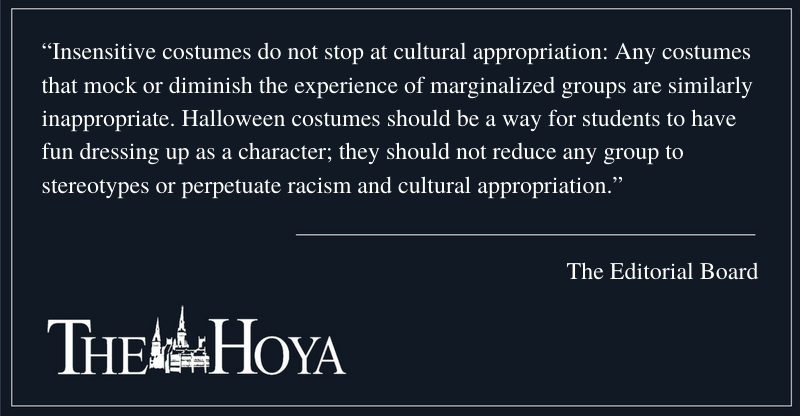With Halloween less than a week away, many students are looking for a costume. When choosing Halloween costumes, students must make sure they avoid racist and otherwise inappropriate outfits.
This year alone has seen prominent politicians exposed for wearing racist costumes. In February, a yearbook photo of Virginia Gov. Ralph Northam showed one man in a Ku Klux Klan costume and another man in blackface. Northam did not say which costume he was wearing, but apologized for his insensitive actions. And, last month, Canadian Prime Minister Justin Trudeau was discovered to have worn brownface makeup at an “Arabian Nights”-themed party in 2001. Trudeau has since apologized, citing his ignorance on the racist nature of brownface makeup.
The racist costumes of prominent politicians have dominated the headlines recently, but college campuses are certainly not immune to such issues. In 2017, students at Princeton University hosted a “Mexican-themed party” event, encouraging students to partake in such racist costumes as a “sombrero, bikini [and] fake mustache.”
While this editorial board is not aware of recent cases of such costumes on Georgetown University’s campus, students should educate themselves on the historically problematic connotation of potential costume choices to avoid choosing offensive outfits.
Blackface and brownface are among the most egregious cases of racist costumes, but costumes can be racist in other ways, such as cultural appropriation. The use of clothing and headdress that resemble items associated with Native American tribes is also an offensive and inappropriate costume choices.
The use of culturally significant items of marginalized groups out of context by members not in the group for the sake of entertainment demonstrates a remarkable lack of respect for those communities. Specifically, wearing costumes without considering their historical significance harms Native American communities, according to Tesia Zientek, tribal member and Citizen Potawatomi Nation’s education director.
“It’s harmful, and it hurts to know that they are getting to use things that our ancestors were not allowed to use, and use them in a way that it is inconsistent with our culture,” Zientek said in an article on the Citizen Potawatomi Nation website.
Costumes resembling Native American clothing are unfortunately often prevalent on Halloween, but other marginalized groups also suffer from appropriation. A simple Google search of the term “Halloween costume” paired with descriptions of different ethnic groups yields image results of people wearing large sombreros, “geisha” costumes or costumes that purportedly resemble ancient Egyptian deities. Such caricatures minimize entire cultures down to a cheap costume and inflict harm on the communities.
Insensitive costumes do not stop at cultural appropriation: Any costumes that mock or diminish the experience of marginalized groups are similarly inappropriate. Halloween costumes should never make light of difficult experiences, such as the experiences of people with mental health struggles or people who have been convicted of crime.
Halloween costumes should be a way for students to have fun dressing up as a character; they should not reduce any group to stereotypes or perpetuate racism and cultural appropriation.
Students must, in the spirit of inclusivity and respect, think carefully about the historical and cultural significance of any costume they might choose to wear. If a student realizes that the costume is inappropriate, the solution is simple: Wear something else.
The Hoya’s editorial board is composed of six students and chaired by the opinion editor. Editorials reflect only the beliefs of a majority of the board and are not representative of The Hoya or any individual member of the board.















Joehoya • Dec 13, 2019 at 4:12 pm
This is so jump the shark lame. Should girls not dress like hookers because it denigrates the oldest profession? World would be a lot less fun if these people keep pushing whatever the moment’s scarlet letter that’s offensive silliness dictates.
hoyalum • Nov 27, 2019 at 2:16 pm
What if the intent is to honor the culture, such as Joy Behar’s “Beautiful African Woman” (blackface) costume?